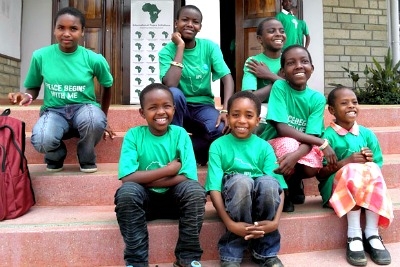For peaceful development to spread, local people must be able to take charge of their own approaches. Dr Karambu Ringera discusses how her organisation supports this work in communities around Kenya.
In a world which believes deeply in the idea of war as a means of building peace, it is difficult to imagine alternative ways of doing so. But it is clear to me that peace and change come when people begin talking to one another. At International Peace Initiatives, we do not see peace as merely the absence of war, but as a situation in which people can meet all their basic needs.
Our approach to peace building is therefore hands on, inclusive, participatory, and holistic, linking many aspects of people’s lives where communities meet. The beginning point of this intricate and complex dance is within the individual. Transformation and change must take place in every person, allowing peace to be shared and spread. Then families, communities and nations can be changed.
Our model and transformative work, with marginalized people in both rural and conflict settings, is based on this philosophy. We work to support and fund initiatives that mitigate the effects of war, disease, poverty, and discrimination. IPI houses and provides for orphans and vulnerable children, teaches peace education, and supports African grassroots organisations and community leaders to create initiatives that lead to self-empowerment, self-reliance and sustainability. We work in particular with enable groups to strengthen their voice in discussion around social change and development.
Contemporary peace and development interventions in Kenya often accord value to ‘protectionist’ and ‘dominating’ approaches to initiatives that address poverty, war, and disease. They rely on the continued input of others. The consequence of such interventions is that they create dependency and are not sustainable. They deny marginalized groups the ability to voice their needs and fail to inspire innovative, relevant, home-grown solutions, and hence their independence.

We believe in supporting a new breed of peace and development conscious agents, who wish to see marginalised people take charge of their lives. By listening to people and inviting them to be critical and innovative creators of their futures, the opportunity for real peace to develop opens up.
We have therefore set up a number of projects in what we call the Network of Enterprises. This is an effort to create a planned, sustainable network of vocational skills development, organic agricultural products and cottage industries to support IPI’s programs. By setting up enterprises that are interdependent and that take advantage of community resources and needs, IPI’s children’s homes and the groups we work with will be largely self-sustaining. Our participatory and self-reflexive approach for child-residents and women is grounded in our “3Es” approach: education, enterprise and empowerment, and helps instill life skills that lead to inter-dependence, self-esteem and self-reliance.
The Institute for Nonviolence and Peace (INPEACE) is another IPI programme. It funds special projects that promote peace within individuals and across communities. We use a peace circle method that brings groups together to speak with each other in times of conflict.
Between 2008 and 2014, INPEACE ran initiatives in the UK, India and South Africa. In Kenya, we have instituted peace circles for women, men and young people. In partnership with the Satyana Institute, we facilitated gender healing and reconciliation workshops in Kenya, India and South Africa; with UN Women, we have facilitated training workshops for peace committees and monitors in Kenya in 2013. We also partner with local high school and college students to hold peace dialogues and to brainstorm ways to sustain peace in our individual lives. We believe peace must begin within each of us before we can help spread it to others.
Peace building in Kenya is a complicated and delicate issue. We firmly believe that the best course is to listen to people on the ground, and enable to them to put their approaches first. At the end of our work, if people can look back and see what they have achieved, then there will be a chance for Kenya’s peaceful development to take off.
This article was originally published on Insight on Conflict, Peace Direct’s online resource for local peace building and human rights in conflict areas.
